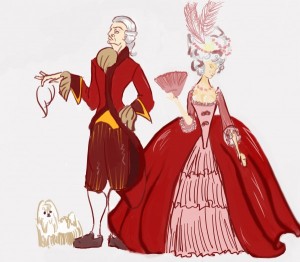
Recently I answered a Name Assistance problem, where the mother was worried that her baby might arrive early, and she was therefore running out of time to find a name for her daughter. I reassured her that as Australians have 60 days to register a baby’s name after its birth, there was no need to panic.
Blog reader Ingrid asked, what happens if you don’t name the baby within 60 days? Would the authorities take your baby away from you, she wondered, or would they name the baby on your behalf?
A very reasonable question! The main things to remember are a) registering a birth is free, so you don’t need to put it off until you can afford it and b) authorities must always register a birth, so no matter how late you are, they are legally obliged to register your child. Don’t ever think that it’s “too late” to register your child’s name, or you’ve “missed the deadline”.
I thought I’d have a look at what penalties are officially in place for those who fail to make the 60-day deadline. This varies from state to state.
* New South Wales does not issue any penalties for a late registration, and they say their role is to support parents during the registration process. However, you may have to provide more forms of identification, and the process can be longer and more complex. For that reason, they recommend you make an effort to reach the deadline promptly.
* In Victoria, the penalty for failing to register a child’s birth within 60 days is $1408 – although in practice it is almost unknown for any penalty to actually be applied. They can issue a court order to insist on a birth registration, or to alter one which is considered invalid or incomplete. Children who have been abandoned and their parents unknown will have their births registered, and a name will be given to the child (so yes, they can name the baby on your behalf, if they can’t find you).
* In Queensland, if you register your child’s birth after the 60 day deadline, you can be charged a $4.50 late fee. Queensland is the only state to charge for registration, and that’s only if you’re past the deadline.
* In South Australia, you can be asked to make a statutory declaration before a Justice of the Peace for a late birth registration.
* In Tasmania, you may be asked to provide extra information and identification, including a letter from the hospital.
* Western Australia says nothing about late registrations. They note that staff will help you with the registration process (as they do in all states and territories).
* In the Australian Capital Territory, you are given a full six months to register a child’s birth. They say nothing about late registrations.
* In the Northern Territory, if you do not register a birth within six months, it will be registered as “Unnamed baby”, and they will complete the registration process on your behalf, with what information they can find. This information will assist you when you register the birth yourself, and apply for the birth certificate.
It should be remembered that failing to register a child’s birth is a serious matter. The Australian Human Rights Commission states that every child has the right to a name, and to have their name registered immediately after birth.
Unicef released a report last year which found that a third of children worldwide do not have their birth registered by their fifth birthday, with the lowest registration rates in South Asia and Sub-Saharan Africa. Without birth registration, these children are the first to fall through cracks in the system. They are much less likely to be immunised against diseases, or to gain an education.
They are much more likely to suffer abuse and neglect, to be abducted and trafficked, and to become separated from their families during conflict or natural disaster. Without being able to verify their age with a birth certificate, they may be forced into child labour, treated as an adult in the justice system, conscripted into the armed forces, or be sexually exploited through under-age marriage or prostitution.
You might think that this is something that only happens in developing countries, but unfortunately it is a problem in Australia too. Just this year, a couple from Melbourne pleaded guilty to failing to register their son’s birth, and also pleaded guilty to neglect – neglect so severe that their five-year-old son died from a cut on his foot due to living in filthy conditions. The little boy had never been immunised, was not enrolled in kindergarten, and barely had contact with the outside world.
This is exactly what Unicef is talking about. While failing to register the birth doesn’t necessarily make you a neglectful parent, neglectful parents are less likely to register their child’s birth – and failing to register makes it easier to hide child neglect and abuse. Just as with the statistics from Unicef, this little boy wasn’t immunised or part of the education system. Not that those things are illegal in themselves, but it shows that the patterns identified by Unicef hold true, whether we’re talking about a village in Africa or a suburb in Melbourne.
That was an unusual case, but failure to register children’s births is a significant problem in Australia, leaving thousands of young people bereft of an identity. Many of them are Indigenous, and in rural or remote communities, but some are from non-English speaking backgrounds, homeless, or have parents who are drug affected, mentally ill, or intellectually disabled. Some have their births unregistered altogether, while others have been registered, but do not have a birth certificate – although registration is free, a birth certificate will cost around $45.
In a study conducted by Dr Paula Gerber, associate professor and deputy director of the Castan Centre for Human Rights Law at Monash University, the cost of the birth certificate was often cited as a reason for failing to lodge the paperwork. There could also be problems with literacy and English language skills, a distrust of authority, and the lack of confidence to handle official business. There could be strong feelings of shame stopping people from asking for necessary assistance.
Dr Gerber also believes that changes to the birthing system have played a role. It used to be that when women gave birth in hospital, they spent up to a week there after the birth, with hospital staff on hand to assist them with registration. These days you are discharged from hospital as soon as possible, and as you leave, handed a huge pack of paperwork, which can get lost or damaged.
Some are calling for changes to the registration process, so that birth registration and receiving a birth certificate is automatically done on the basis of hospital admission records. In Africa, birth registration can be done by mobile phone, and mobile birth registries travel regularly through regions: perhaps this could work better than our highly centralised system where forms must be mailed in.
The consequences of not having a birth certificate in the 21st century are dire. You need a birth certificate to enrol in school, and without one cannot apply for a driver’s license or get a bank account. This seriously hampers employment prospects, and if you do manage to find a job, without a tax file number you will be forced to pay tax at the highest possible rate, losing half your pay. Without access to a driver’s license, many young people whose births were never registered resort to driving unlicensed, which eventually leads to their imprisonment for traffic violations.
If you would like to know what it’s like to not have your birth registered, listen to Charmaine Webster, a Queensland woman who was born forty years ago, and has no official identity. She grew up in a family where birthdays were not celebrated, and her birth was never registered, even though those of her four older siblings were. Her older sister cannot remember Charmaine being born, and only remembers her being part of their family from the age of three.
Charmaine lost contact with her parents, who she considers to have been abusive, in her early adulthood, and hasn’t been able to obtain information about her birth from them. In her teens, she was able to work fairly easily by registering for a tax file number at the post office; however, in the last decade laws have changed, and employers are now fined for hiring workers who cannot prove their Australian citizenship. Because Charmaine cannot prove her citizenship with a birth certificate or passport, she cannot get a job.
She began asking help in 2000, when she wanted to get married; in the end a friend who was a Justice of the Peace organised the necessary documents for her. Since then, she has continued searching for answers, with each government department sending her on to another in a fruitless quest. She has become exhausted by the search, and watched her children get their driver’s license and start work while she can’t. She says that without being registered, you officially don’t exist, and when you don’t exist, you live in poverty.
So I think that has answered the question of what happens if you don’t make the 60 day deadline to register your child’s birth. Nothing. You just have to do it as soon as you can, which may be more complicated than if you’d done it straight away. If you haven’t done it by their sixth birthday, your child won’t be able to start school.
And if you neglect or refuse to register your child at all? That has been answered as well. You will have made it impossible for them to get a passport, a bank account or a driver’s license, ruined their prospects of employment, increased their chances of imprisonment, and condemned them to poverty.
They will have no identity, and no citizenship. Furthermore, it won’t be something that they can easily sort out for themselves as an adult without your help – help that they should have been given as soon as they were born. A name is the first gift you give your child, and registering that name is the first human right they receive.
POLLRESULTS
Question: What could be done to make birth registration easier?
Birth certificates should be an automatic part of the registration process – 21%
Birth certificates should be free for everyone – 21%
Mobile birth registries should travel regularly through remote areas – 18%
It should be possible to register a birth online – 14%
Birth registration should be completed before leaving hospital – 12%
Fees for birth certificates should be waived for the disadvantaged – 11%
Only one person thought that the system was fine as it was and didn’t need to be changed, and nobody thought it was a good idea for birth registration via mobile device to be made possible.
Thank you to Ingrid for helping to suggest this post.
(Example birth certificate from Births, Deaths and Marriages Victoria)










